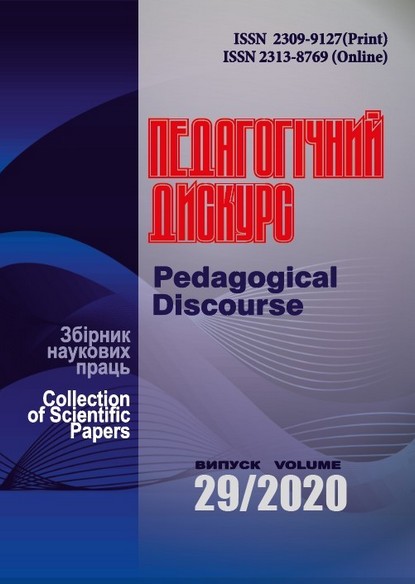European Experience Features of Translation Theory and Practice Teaching of Future Foreign Philologists
Abstract
The article analyzes the experience of professional training of future translators with the use of information and communication technologies in higher education institutions of the European Union. Requests from developed European countries form a new level of translation. Today, there is an extensive network of translation education in the world, which includes public universities, public and private schools and translation institutes, and courses. There are several basic models for training translators. Educational programs and qualification characteristics of graduates are adjusted according to the needs of the translation services market. 215 higher education institutions train translators in Europe. In Western European countries, the most common are the following qualification levels: «bachelor», «master», «doctor of philosophy».
The student has the opportunity to create an individual package of courses. Getting quality education by future translators requires significant resources and contributions. Universities have a high level of logistics. The practical component of the programs has active and passive production practices. The training of future translators in universities is based on the principles of scientificity, continuity and continuity of education, taking into account the capabilities of modern information technology.
Interactive information technologies that develop translators' communication skills are common in British universities. In France, multidisciplinary translators, specialists in localization, terminology, legal translation, translators of official documents, etc. are currently being trained. Particular attention is now being paid to training translators in the use of SAT technologies. In Austria, translators are trained at three universities in the country.
The effectiveness of measures to improve the quality of professional training of future translators in the information and educational environment of the university depends on the positive components of foreign experience.
Downloads
References
Amelina, S. M. (2011). Osoblyvosti teorii i praktyky perekladu v pidhotovtsi perekladachiv u FRN [Features of the Theory and Practice of Translation in the Training of Translators in Germany]. Profesiina pedahohichna osvita u poliprofilnomu navchalnomu zakladi – Professional Pedagogical Education in a Multidisciplinary Educational Institution. Retrieved from http://journals.nubip.edu.ua/index.php/Pedagogica/article/viewFile/2907/2846 ( [in Ukrainian].
Vidkrytyi universytet (Velyka Brytaniia) [Open University (UK)]. Retrieved from https://uk.wikipedia.org/wiki/Відкритий_університет_(Велика_Британія) [in Ukrainian].
Dolynskyi, Ye. V. (2013). Dosvid vykorystannia novitnikh informatsiinykh tekhnolohii u pidhotovtsi maibutnikh perekladachiv v universytetakh Velykoi Brytanii [Experience in Using the Latest Information Technologies in the Training of Future Translators in UK Universities]. Informatsiini tekhnolohii v osviti – Information Technologies in Education, 17, 91–98. Retrieved from http://ite.kspu.edu/webfm_send/742 [in Ukrainian].
Dolynskyi, Ye. V. (2014). Osoblyvosti formuvannia informatychnoi kompetentnosti maibutnikh perekladachiv v universytetakh Yevropeiskoho soiuzu [Features of Formation of Computer Competence of Future Translators in Universities of the European Union]. Porivnialna profesiina pedahohika – Comparative Professional Pedagogy, 4 (3), 145–149. [in Ukrainian].
Levytska, N. V. (2011). Kontseptualni zasady profesiinoi pidhotovky perekladachiv v krainakh Zakhidnoi Yevropy [Conceptual Principles of Professional Training of Translators in Western Europe]. Visnyk Natsionalnoi akademii Derzhavnoi prykordonnoi sluzhby Ukrainy – Bulletin of the National Academy of the State Border Guard Service of Ukraine, 5. Retrieved from http://nbuv.gov.ua/UJRN/Vnadps_2011_5_16 [in Ukrainian].
Leonova, A. S. (2012). Specifika informacionnoj podgotovki perevodchika: trebovaniya ry’nka [Specificity of Information Preparation of a Translator: Market Requirements]. Istoricheskaya i socialno-obrazovatelnaya my’sl – Historical and Socio-Educational Thought, 3 (13), 122–124.
Maksymenko, L. O. (2015). Zarubizhnyi dosvid orhanizatsii pidhotovky perekladachiv na suchasnomu etapi rozvytku vyshchoi osvity [Foreign Experience in Organizing the Training of Translators at the Present Stage of Development of Higher Education]. Visnyk Chernihivskoho natsionalnoho pedahohichnoho universytetu. Ser.: Pedahohichni nauky – Bulletin of Chernihiv National Pedagogical University. Ser.: Pedagogical Sciences, 131, 74–78. Retrieved from http://nbuv.gov.ua/UJRN/VchdpuP_2015_131_19 [in Ukrainian].
Sierhieieva, O. V. (2012). Profesiina pidhotovka perekladachiv v universytetakh Velykoi Brytanii [Professional Training of Translators in British Universities]. Candidate’s thesis. Khmelnytskyi [in Ukrainian].
Skyba, K. M. (2014). Profesiina pidhotovka perekladachiv u krainakh-uchasnytsiakh Bolonskoho protsesu [Professional Training of Translators in the Countries Participating in the Bologna Process]. Pedahohichnyi protses: teoriia i praktyka – Pedagogical Process: Theory and Practice, 4, 80–86. [in Ukrainian].
Copyright (c) 2020 Pedagogical Discourse

This work is licensed under a Creative Commons Attribution-NonCommercial-ShareAlike 4.0 International License.

















